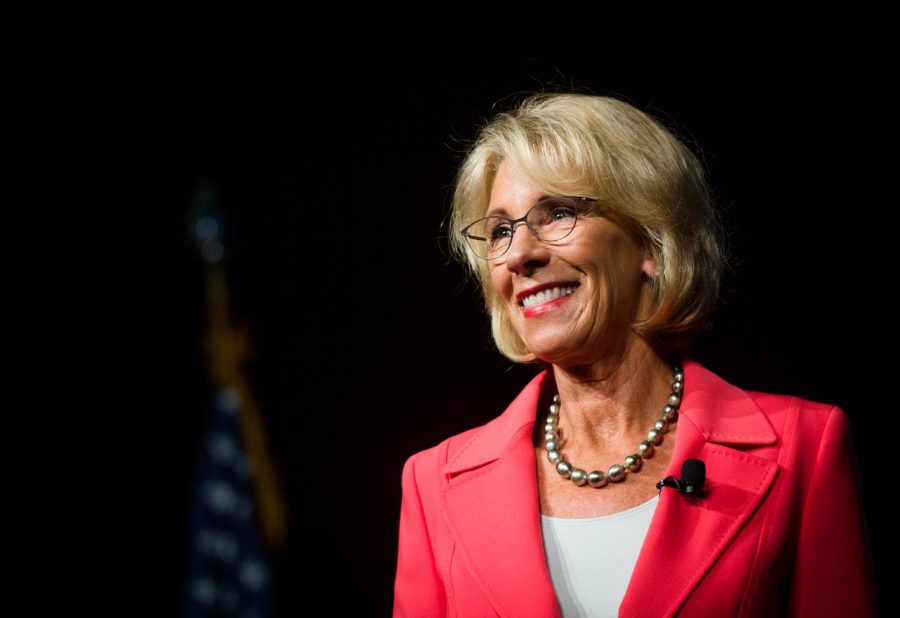Federal comments signal Title IX change
September 11, 2017
In an address at George Mason University in Arlington, Virginia, Education Secretary Betsy DeVos announced adjustments to rules on Title IX regulations.
In her address, DeVos said the current Title IX regulations have resulted in a failed system.
“The era of ‘rule by letter’ is over,” DeVos said. “Through intimidation and coercion, the failed system has clearly pushed schools to overreach.
“Every survivor of sexual misconduct must be taken seriously,” DeVos continued. “Every student accused of sexual misconduct must know that guilt is not predetermined.”
Patricia Minter, WKU history professor, said that at this point the comments are very vague and do not reflect any direct policy change.
One issue Minter had with the comments was DeVos’ use of the term “kangaroo courts” for sexual misconduct hearings. Minter explained the term means someone is presumed guilty and doesn’t have due process of law.
“She’s charging that these university systems are pre-judging people, and innocent people are getting railroaded,” Minter said. “But that term is so pejorative and so inflammatory.”
The use of this term, Minter said, is significant because it signals DeVos planning an overhaul of federal directives on Title IX, which dictates how universities are legally bound to enforce and report sexual assault cases.
After the comments, Minter said many sexual assault advocacy groups were upset and saw it as the Department of Education taking back a commitment to ending rape culture. Minter said the current federal administration has been rightfully criticized for being “openly hostile,” towards ideas about certain civil rights.
“It’s a tone establishment,” Minter said while referring to comments made by President Donald Trump during the campaign about grabbing women.
Minter said there has been a continued sense of fear of sexual assault after the election. She said certain groups felt targeted by the administration.
While others were emboldened to commit acts of violence or openly talk about it in ways they didn’t before.
“Presidents don’t lead people to behave in certain ways,” Minter said. “What they can do is normalize that kind of behavior.”
According to an article by the New York Times, Title IX of the Education Amendments Act of 1972 enacted a harder response to campus sexual-assault cases and prohibited sex discrimination in education. Universities were at risk for less federal funding if they did not comply with Title IX policy.
Because of the drive the federal government has on operations and policy, Minter said there should be cause for alarm.
Kristie Branham, associate professor and director of Gender and Women’s Studies in the department of Diversity and Community studies, said she was ultimately confused by the comments.
“It just seems so not in touch with reality,” Branham said.
Through Title IX, Branham said students are supposed to be guaranteed equal access to university resources no matter their gender. She explained that predominantly female students are afraid to walk to the library or a parking lot at night, which isn’t equal access.
Branham said an example of this at WKU is female students are more afraid of sexual assault happening at certain parking lots.
“Real or imagined,” Branham said. “It still blocks student access.”
As WKU decides how to make campus a safe and welcoming place, Minter said Title IX, the current federal administration and how federal policy affects a university should be up for discussion. Branham said WKU has taken positive steps forward with determination to make campus a safe space and there will be a lot of programming addressing sexual assault throughout the year.
Andrea Anderson, assistant general counsel and WKU’s Title IX coordinator, was contacted for comment but did not respond in time for publication.
During his opening ceremony speech for M.A.S.T.E.R Plan in August, WKU president Timothy C. Caboni made comments referring to sexual assault prevention.
“As a family we are kind and we take care of one another,” Caboni said during his speech. “Look out for each other, keep one another safe.”
Andrea Anderson, WKU’s Title IX Coordinator, was contacted for comment but did not respond in time for publication.
Minter said she was encouraged by Caboni’s comments that the WKU administration would be focused on protecting victims.
“I would hope we don’t need the education department telling us what the right thing to do is,” Minter said. “I would hope that we would just keep doing the right thing on this campus.”
Reporter Rebekah Alvey can be reached at 270-745-6011 and [email protected].


























